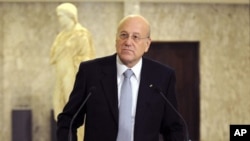Prime Minister-designate Najib Mikati met Wednesday with former prime ministers, including outgoing Prime Minister Saad Hariri. Mr. Hariri headed a Western-backed Cabinet and said earlier this week he would not participate in any new government led by a Hezbollah-backed candidate.
The Shi'ite militant group and its allies resigned from Mr. Hariri's coalition Cabinet earlier this month, causing it to collapse.
The United States is reconsidering economic and military support for Lebanon after Hezbollah won a prominent role in the government of the fragile, religiously-divided nation.
Secretary of State Hillary Clinton said Tuesday that a Hezbollah-dominated government would affect the country's relations with the U.S., which views the Iranian- and Syrian-backed militia as a terrorist organization. The United States has imposed sanctions against the group and its members, with whom U.S. officials are barred from meeting.
|
Key Political Players in Lebanon
|
The White House Tuesday accused the Shi'ite Muslim group of using "coercion, intimidation and threats of violence" to achieve its political ends and said the new government must abide by the Lebanese constitution and renounce violence.
The predominantly Sunni Muslim Saudi Arabia on Wednesday advised its citizens against travelling to Lebanon until the situation was stabilized.
Lebanon's president appointed Hezbollah-backed candidate Najib Mikati prime minister-designate on Tuesday, as protests raged in several cities.
Mr. Mikati told reporters he will seek diverse political interests as he helps direct the formation of the government. He urged all of the country's political parties to take part in the new government, saying his appointment did not signal a victory of one camp over another.
Thousands of angry supporters of former Prime Minister Saad Hariri took to the streets Tuesday in several cities, where they shouted their loyalty to the former leader. Some protesters said they would not allow Lebanon to go down "an Iranian path," a reference to Tehran's support for Hezbollah.
Earlier Tuesday, demonstrators who gathered in support of Mr. Hariri attacked a truck belonging to the Al Jazeera news channel and set it on fire. Protesters also burned pictures of Mr. Mikati. Elsewhere, protesters burned tires and waved flags.
The United States increased assistance to Lebanon's military after its 2006 war with Israel. Lebanon has a long history of sectarian militias, and the U.S. had planned to help professionalize the army and diminish the influence of Hezbollah's forces. Analysts say these goals likely will be harder to achieve under a Hezbollah-dominated government.
Tensions were high in Lebanon because of a U.N.-backed investigation into the 2005 assassination of former Prime Minister Rafiq Hariri, the father of the outgoing prime minister. Media reports have indicated the tribunal would indict Hezbollah members, but the group denies having had a role in the attack.




